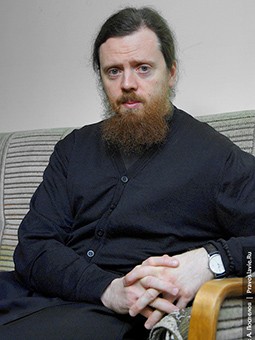
Hegumen Nektary (Morozov)
Husband and wife were standing at the church. Recently they had a tragedy. Their daughter, a 15-year-old girl, committed suicide. They came to talk, to ask what to do with this, whether they can pray for her. I felt sorry for them… but especially for the daughter herself! Hegumen Nektary (Morozov) spoke about why parents do not know anything about their children.
… I told them that you still need to know why this happened, whether she herself made such a terrible decision. But the things she lived for, the things she was worried about, the things that made her happy or upset her – the parents couldn’t say absolutely nothing about any of this. Absolutely!
It accidentally turned out that at that moment she was not alone, there were some friends with her, “her buddies”. But what they did, what connected them, what their names were, and who they were: again the parents couldn’t say. And there was only one answer to all my of questions:
“She seemed absolutely fine, she was out all the time.”
The girl who “was out all the time”, whose closest people were absolutely not interested in her life, “seemed fine”. But she actually felt very bad and very painful, so much that she wanted to end her life. Why? There may be many private reasons, but this one reason of a vacuum within the family, in which there are neither loving relationships, warmth, nor mutual consideration is one of the main reasons. Actually, it is the main one.
I would probably not write about it, those people are grieving, and I am trying to analyze why it happened… I would not do it, if this situation was extraordinary. But it is a standard one.
No, it is not every day that parents come to us who have lost their children like that, although this tragedy cannot be called an exceptional one, but it is rather a standard one.
More often other people come to us, who have also lost their children, but in a different way.
I’m not talking about those who have lost their human image, because they drink or take drugs.
I’m not talking about those who live on the street and eat out of the trash.
I’m not talking about those who teach their children to beg for money from an early age.
And I’m not talking about refugees, either.
I’m talking about ordinary citizens, who do not have any financial issues and in all other senses are well.
Do you know what unites these different and at the same time strikingly similar people?
They know nothing about their children, just as the parents who came to our church and who knew nothing about their daughter, who committed suicide.
Parents ask: “Why is he like that?”
The logic of such parents shocks me every time. Their questions hurt. They speak of their children not merely as if they were speaking about strangers, but they speak of them as if they are aliens whose life is completely incomprehensible to them. They ask me, as if it was me, not them, who raised their son or daughter:
“Why is he (she) such and such? What’s with him (her)? Why is it like this?”
And I, again, answer them over and over again:
“Wait … Was it me who was pregnant with your child and who gave birth to him or her? Do I know your child from birth for 10, 15, or 20 years? Did he inherit my genes?..”
And I meet a puzzled, completely perplexed look.
Someone will say that I am exaggerating. Perhaps. But the one who will say it definitely has not stood at the analogion with the Cross and the Gospel for 20 years. This person has not heard thousands completely different stories of people’s lives and has not felt their pain in his heart.
There are many external reasons why children and parents grow apart: parents work hard, have concerns about providing for their families, or parents have difficulties in their relationships with each other, or somebody has an illness, and so on. But behind all this, in fact, there is one thing: UNWILLINGNESS to know their children and UNWILLINGNESS to understand them. It is a terrible, erroneous decision which parents made at some point and felt that it was easier to live this way, that there was no strength for another life.
There is an axiom that does not seem to need any proof or justification, but it is completely forgotten and deactualized: it is not enough to feed, dress, vaccinate and heal a child, taking him or her to school and additional classes. It is not even enough to read good books together and watch good films. It is not even enough to go to church together, make a confession and receive Holy Communion, pray and go on a pilgrimage together.
What is enough and what is needed then? It is a very natural and, as it turns out, very difficult thing: to live one life. Never allow this sorrowful separation in the heart: “I and he, and she, and they …”, but always have only one feeling: “We.”
How not to lose your child
This is not determined by either the level of financial well-being, or the level of education: neither knowledge, nor intelligence, nor even innate or acquired intellectual achievements have nothing to do with it. The determining factor is different: do you love your child? Do you know how to love? Are you ready to learn to do it? The answer to this question is everything.
After all, what does it mean to love? It is to feel as one, as a whole being. It is to be interested in what is interesting to the other person. It is to worry about what he or she is worried about. It is to rejoice when something makes him or her happy. And much, much more like that.
There are many mistakes that a person can make in life. There are many things that he can do not to a full extent, as it is customary to say – not finish. But it seems to me that the worst mistake is to not love your child to a full extent. The one who was born thanks to you, for whom your love, attention and understanding, warmth and care are initially more important than anything in the world. All mistakes have a price, but this mistake has the most expensive one.

Photo: Warren Wong / Unsplash
The point is not to know the contents of a daughter’s or son’s computer, to regularly view his or her messages on their smartphones, to monitor and “watch”. The point is that they themselves would want to share with you what is important to them, what worries them, and what they cannot figure out.
Why is someone else getting closer to them than you? Why do “street”, “Internet”, “TV” win over you in the fight for their soul? Is it because they are “like this”? Is it because it cannot be otherwise?
No. The whole question is not what they are, but what you are. And not only it can be different, but it should be.
Your child, that small, helpless, and defenseless baby lay in your arms. He was completely dependent on you. On what you gave him. On what you taught him. And if at some point it seemed to you that he was lost or left you, then this is not true. In fact, it was you yourself who lost him. You missed him, distracted yourself. Moreover, pushed him away, removed him from yourself. Is it hard to believe? But with rare, very rare exceptions, this is so. It doesn’t have to be that way. And it only depends on you whether it will be so or not. Really.


















